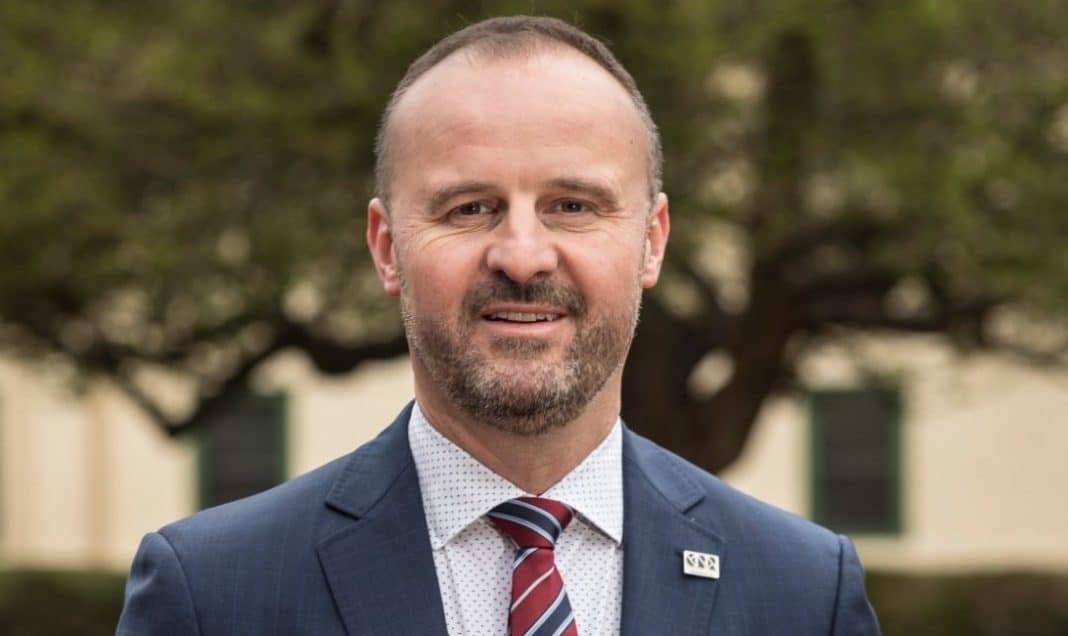Economic recovery is “front and centre” of the ACT Government’s work in 2022, and the government will create and protect more jobs, Chief Minister Andrew Barr announced in the Legislative Assembly this morning.
The ACT economy had “bounced back” from the setbacks of the last two years, Mr Barr said, thanks to its “resilient, strong, and increasingly diverse” pre-pandemic economy and “sound” public finance management. (The ACT is the only subnational jurisdiction in Asia Pacific with a AAA credit rating.)
“The ACT Government balance sheet was able to provide the countercyclical public investment required over the past two years to buffer the enormous economic shock we’ve experienced,” he said.
During the pandemic, the government provided more than $500 million in additional health funding; allocated more than $475 million in targeted small and medium business support; and more than $200 million in additional funding for education and skills.
Mr Barr said this public investment delivered “incredible” economic outcomes. The ACT’s Gross State Product for 2019–20 was 3.7 per cent, and 2.8 per cent for 2020–21. Household consumption fell 2.6 per cent in 2019–20, but was offset by a 7.7 per cent growth in public consumption; household consumption bounced back in 2020–21 with greater consumer confidence.
Although the beginning of the 2021–22 financial year was “difficult”, due to the lockdown, the ACT recorded its highest ever monthly retail trade turnover in November: $616 million, higher than the ACT’s three-year average of $544 million. This was sustained in December, when $596.6 million was spent at ACT businesses.
Retail trade grew over the last two years, from $6.14 billion in 2019 to $6.78 billion in 2021.
Mr Barr acknowledged, however, that the record consumer spend was not uniform, and that some areas of the economy benefitted more than others. The government recently extended business support measures to food service businesses and tourism and hospitality. (Local businesses said these provided some relief in the “shadow lockdown”, but wanted the government to do more to restore consumer confidence.)
Mr Barr was “cautiously optimistic” that household consumption would “bounce back” once the Omicron variant subsided, and international migration and travel increased.
ACT Business Chamber: Government must support local businesses
But the situation may be less rosy than Mr Barr suggests, according to Graham Catt, CEO of the Canberra Business Chamber. The ACT economy, he argued, relies on private business to create jobs, and many of those businesses are struggling.
“There are 30,000 private businesses in the ACT,” Mr Catt said. “The vast majority are small enterprises that are the passion and the life’s work of their owners. It is these businesses, not the public sector, that now provide 60% of the territory’s jobs.
“Many were hit hard by COVID-19 in 2020, then even harder again in 2021, and we saw jobs lost and businesses closed.
“While November and December did see record spending in some sectors, January has been a very story. Many businesses, especially those in tourism, events, fitness, retail, and the arts are telling us business has been worse than ever.
“We’ve seen our unemployment rate rise rapidly over the past year, while at the same time skills and labour shortages continue to be a huge problem for ACT employers. Businesses are forced to look elsewhere for the people they need to grow, the Territory misses out on potential revenue and investment, and some companies have no choice but to move interstate.
“Now is the time to do everything possible to support our local businesses as the economy slowly reopens over 2022, and to protect and create jobs in the private sector. Only in this way will we drive the economic diversity and growth needed for a sustainable economy.”
Health, law reform, and infrastructure are other priorities for government
The ACT Government will also maintain its public health response to the pandemic. The ACT had the highest COVID-19 double-dose vaccination rate in the country (98.6 per cent), and more than half of all eligible Canberrans had received their booster shot.
“This is not enough; we must boost as much of population as possible,” Mr Barr said. “Vaccination has been the crucial step to protecting ourselves, our families, and our community, allowing us to transition away from lockdowns and returning to a more normal life.”
The ACT Government would pursue an “ambitious and progressive” legislative program, Mr Barr said. Among other reforms, the government seeks to decriminalise small quantities of illicit drugs; raise the minimum age of criminal responsibility; reform laws around domestic and family violence and violence against women; make it easier for trans and gender-diverse people to change their birth registration and birth certificate; work towards a treaty with Indigenous people; and review the Discrimination Act.
The ACT Government will invest in infrastructure “built for Canberra, built to support the city Canberrans want”. In this year’s budget, the government announced it would spend $6.4 billion on infrastructure. It will build new facilities in public healthcare (expanding Canberra Hospital), education (more schools, a new CIT Woden campus), transport network (extending light rail to Commonwealth Park, then to Woden), city services, and arts and entertainment precincts. These will create and protect local jobs.
“We live in a time of great uncertainty,” Mr Barr said. “We don’t know everything that is coming next. However, we enter 2022 with optimism, community resilience, and a focus on delivering our important legislative, infrastructure and services platform – many of which will contribute to our economic recovery in the months and years ahead.”



